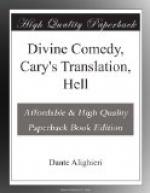Straight Ciriatto, from whose mouth a tusk
Issued on either side, as from a boar,
Ript him with one of these. ’Twixt evil
claws
The mouse had fall’n: but Barbariccia cried,
Seizing him with both arms: “Stand thou
apart,
While I do fix him on my prong transpierc’d.”
Then added, turning to my guide his face,
“Inquire of him, if more thou wish to learn,
Ere he again be rent.” My leader thus:
“Then tell us of the partners in thy guilt;
Knowest thou any sprung of Latian land
Under the tar?”—“I parted,”
he replied,
“But now from one, who sojourn’d not far
thence;
So were I under shelter now with him!
Nor hook nor talon then should scare me more.”—.
“Too long we suffer,” Libicocco cried,
Then, darting forth a prong, seiz’d on his arm,
And mangled bore away the sinewy part.
Him Draghinazzo by his thighs beneath
Would next have caught, whence angrily their chief,
Turning on all sides round, with threat’ning
brow
Restrain’d them. When their strife a little
ceas’d,
Of him, who yet was gazing on his wound,
My teacher thus without delay inquir’d:
“Who was the spirit, from whom by evil hap
Parting, as thou has told, thou cam’st to shore?”—
“It was the friar Gomita,” he rejoin’d,
“He of Gallura, vessel of all guile,
Who had his master’s enemies in hand,
And us’d them so that they commend him well.
Money he took, and them at large dismiss’d.
So he reports: and in each other charge
Committed to his keeping, play’d the part
Of barterer to the height: with him doth herd
The chief of Logodoro, Michel Zanche.
Sardinia is a theme, whereof their tongue
Is never weary. Out! alas! behold
That other, how he grins! More would I say,
But tremble lest he mean to maul me sore.”
Their captain then to Farfarello turning,
Who roll’d his moony eyes in act to strike,
Rebuk’d him thus: “Off! cursed bird!
Avaunt!”—
“If ye desire to see or hear,” he thus
Quaking with dread resum’d, “or Tuscan
spirits
Or Lombard, I will cause them to appear.
Meantime let these ill talons bate their fury,
So that no vengeance they may fear from them,
And I, remaining in this self-same place,
Will for myself but one, make sev’n appear,
When my shrill whistle shall be heard; for so
Our custom is to call each other up.”
Cagnazzo at that word deriding grinn’d,
Then wagg’d the head and spake: “Hear
his device,
Mischievous as he is, to plunge him down.”
Whereto he thus, who fail’d not in rich store
Of nice-wove toils; “Mischief forsooth extreme,
Meant only to procure myself more woe!”
No longer Alichino then refrain’d,
But thus, the rest gainsaying, him bespake:
“If thou do cast thee down, I not on foot
Will chase thee, but above the pitch will beat
My plumes. Quit we the vantage ground, and let
The bank be as a shield, that we may see
If singly thou prevail against us all.”




